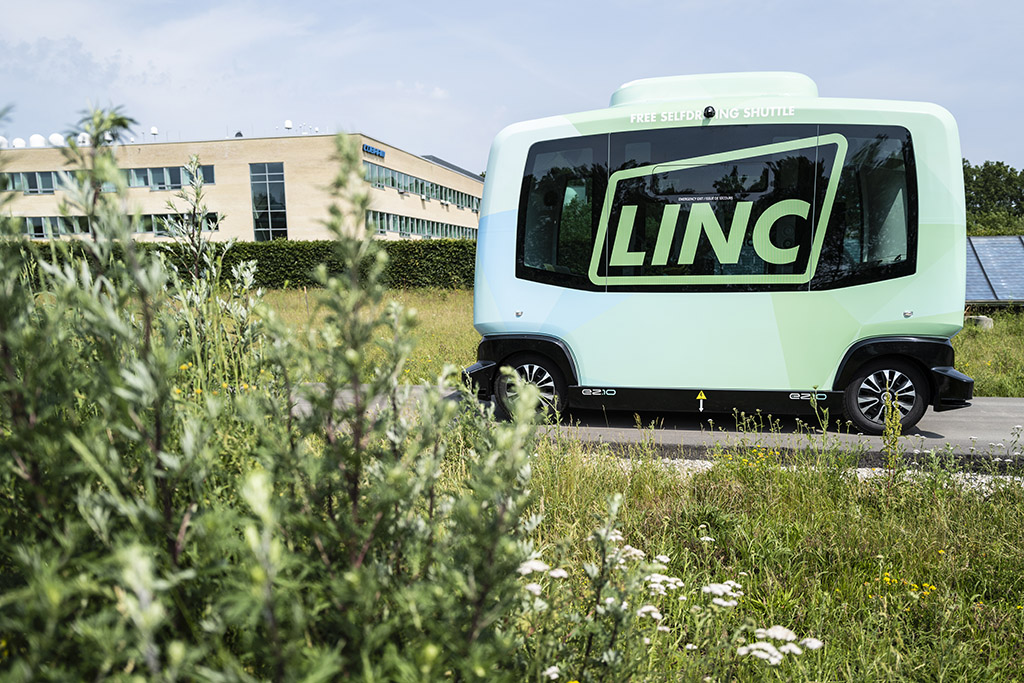
Be a part of testing the self-driving shuttles at DTU
Scroll ned for at læse mere

Scroll ned for at læse mere
By Lene Ulsted Carlsen
You can now register to be a test passenger when three self-driving shuttles begin their six-month trial at DTU Lyngby Campus at the end of this year.
“We are now confident that we will get the necessary permits to drive, so we have opened registrations. We are really looking forward to seeing how many people are interested in trying out this new, exciting form of transport,” says Kenneth Jørgensen, project manager for LINC in Gate 21.
All employees, students and visitors at DTU can become test passengers. LINC, which is one of the largest Danish projects for self-driving shuttles, will operate in the southern part of DTU Campus Lyngby. See the route here.
The project is looking for a minimum of 500 students, staff and frequent campus guests who want to become test passengers. Throughout the test, they will answer individual questionnaires and be able to participate in competitions.
The self-driving shuttles test will provide insights into what you as a passenger think about this new mode of transportation, and how self-driving shuttles can become part of the future for urban environments and public transportation. This will be accomplished through questionnaires before and during the test, as well as through an app specially developed for LINC.
“Even before the test starts at the end of the year, we want to find out about the test passengers’ transportation habits to see if this new form of transportation can become an alternative in their everyday lives. We want to be able to investigate whether people’s behavior changes through the experiment and we want to be able to assess the long-term potential for the self-driving shuttle – we want to investigate passengers’ behavior in relation to waiting time, driving comfort, travel time and how the weather plays a role on their choice of transportation on campus,” says Jeppe Rich, professor at DTU Management.
In addition, Roskilde University will investigate what passengers think about the new mode of transportation and how they move in and around the self-driving shuttles. Last, but not least, before the test, test passengers will be asked to download an app that they will need in connection to the test.
DTU Compute, in collaboration with IBM LINC, is developing the app for test passengers. The app provides access to see the current location of the self-driving shuttles and when they are running. At the same time, the researchers are using the app to collect data on the test passengers’ behavior and movement patterns in connection to their use of the three shuttles.
What is special about the app is that it combines well-known technology from running and health apps, with elements of traffic research.
“We are taking the app a step further than others. It is not just a tracking app where we can see how many people have taken the self-driving shuttle bus. We can actually use it as a tool and integrate it with a questionnaire. Using bluetooth beacons, we can analyze data more accurately while passengers are in the bus. Hopefully, it can give us an even more detailed insight into their transportation patterns,” says Per Bækgaard, associate professor at DTU Compute.
In addition to DTU and RUC, Albertslund Municipality, Gladsaxe Municipality, Nobina Danmark A / S, IBM Danmark ApS and Gate 21 are part of LINC. The project is also open for collaboration with other research groups and student projects.
Do you want to help shape the transportation of the future? Register now as a test passenger and become a part of one of Denmark’s largest tests of self-driving shuttles.
Read more and sign up here.
LINC is one of the largest projects for self-driving shuttles in Denmark. We test them in natural urban environments with daily passengers who need transportation. The aim is to develop public transportation so that it becomes an attractive and green alternative for citizens in the future.
The project partners are: Albertslund Municipality, Gladsaxe Municipality, Nobina Danmark A / S, IBM Danmark ApS, Technical University of Denmark, Roskilde University and Gate 21.
The project is funded by the project partners, as well as the EU program Urban Innovative Actions (UIA), which supports the project with 25 million DKK.
Read more about LINC here.